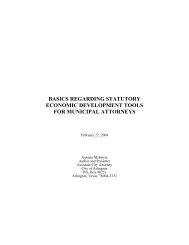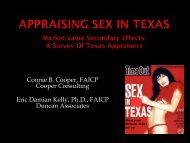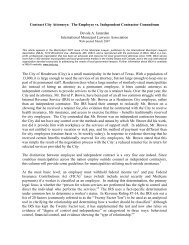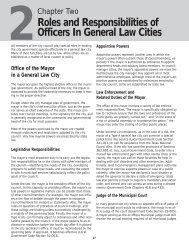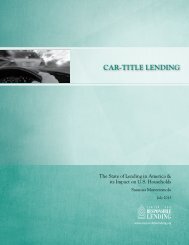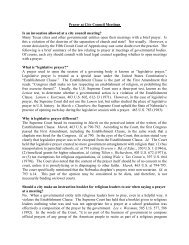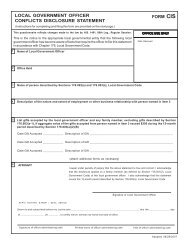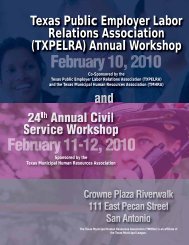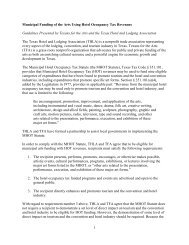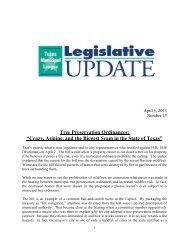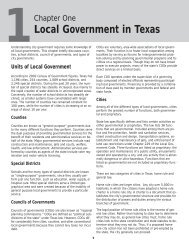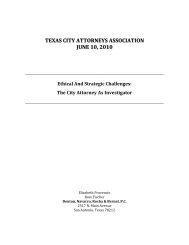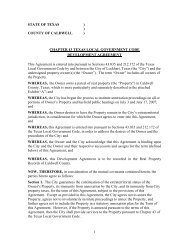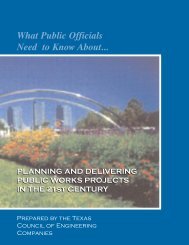Outdoor Burning in Texas - Texas Municipal League
Outdoor Burning in Texas - Texas Municipal League
Outdoor Burning in Texas - Texas Municipal League
- No tags were found...
Create successful ePaper yourself
Turn your PDF publications into a flip-book with our unique Google optimized e-Paper software.
OUTDOOR BURNING IN TEXAS• specify<strong>in</strong>g residential properties for which the site hasbeen designated, and ma<strong>in</strong>ta<strong>in</strong><strong>in</strong>g a record of thosespecific residential properties. The record must conta<strong>in</strong>a description of a platted subdivision, a list of all specificresidential addresses, or both. This record must be madeavailable with<strong>in</strong> 48 hours of any request by any authorityhav<strong>in</strong>g jurisdiction.Furthermore, the owner of the site is required to ensurethat all activities at the site comply with this exception. Theowner must:• ensure that all waste burned at the site consists of trees,brush, grass, leaves, branch trimm<strong>in</strong>gs, or other plantgrowth, and was generated at one of the specific residentialproperties for which the site is designated; and• ensure that all burn<strong>in</strong>g at the site is directly supervisedby a paid, on-duty fire department employee who ispart of the fire protection personnel and is act<strong>in</strong>g <strong>in</strong> thescope of his or her employment. The fire-departmentemployee must notify the appropriate TCEQ regionaloffice by phone or fax 24 hours <strong>in</strong> advance of each burn.The TCEQ will supply the employee with <strong>in</strong>formationon practical alternatives to burn<strong>in</strong>g.6. Crop residues. When there is no practical alternative,crop residues may be burned as part of agriculturalmanagement. <strong>Burn<strong>in</strong>g</strong> carried out under this exception mustconform to the general requirements for outdoor burn<strong>in</strong>g,and structures conta<strong>in</strong><strong>in</strong>g “sensitive receptors” (see box) mustnot be negatively affected by the burn. This exception doesnot apply to crop-residue burn<strong>in</strong>g covered by an adm<strong>in</strong>istrativeorder.“Sensitive receptors” <strong>in</strong>clude humans and livestock,as well as “sensitive live vegetation” suchas nursery plants, mushrooms under cultivation,and plants raised for pharmaceutical production orused <strong>in</strong> lab experiments. For a complete def<strong>in</strong>ition,see 30 TAC 111.203(7).7. Brush, trees, etc., off-site. A county or municipalgovernment may request site and burn approval from theappropriate TCEQ regional office to burn accumulationsof brush, trees, and other plant growth that cause a conditiondetrimental to public health and safety. The burn mustoccur at a site owned by the local government and will beauthorized only if the TCEQ determ<strong>in</strong>es that there is nopractical alternative. The frequency of such burns may notexceed once every two months, and they cannot be used <strong>in</strong>place of other sound brush-management practices. <strong>Burn<strong>in</strong>g</strong>conducted under this exception must conform to the generalrequirements for allowable outdoor burn<strong>in</strong>g. The burn<strong>in</strong>gmay not occur at a municipal landfill without advance permissionfrom the TCEQ.Special restrictions <strong>in</strong> Montgomery County. Regardlessof the seven exceptions given above, <strong>in</strong> un<strong>in</strong>corporated areasof Montgomery County it is a crim<strong>in</strong>al offense, as well as aviolation of agency rules, to burn household refuse on a lotsmaller than five acres or located <strong>in</strong> a “neighborhood.” Theterms “neighborhood” and “refuse” are def<strong>in</strong>ed <strong>in</strong> 30 TAC111.203 (see Appendix C). Under Local Government Code352.082, this restriction could <strong>in</strong> the future also apply tocerta<strong>in</strong> planned communities if a county adjacent to the onewhere such a community is located grows to 3.3 million ormore <strong>in</strong> population.I live <strong>in</strong> a small rural town where most peoplehave their trash picked up by a commercialtrash collection service. I can’t afford to paythat money each month. May I burn my trash<strong>in</strong> a 55-gallon drum <strong>in</strong> my backyard?If the local city ord<strong>in</strong>ance does not make it mandatorythat trash be picked up, and there is no governmentallyauthorized trash-collection service available to you, you mayburn domestic waste on the property where it is produced,as long as outdoor burn<strong>in</strong>g is not prohibited by local rule orord<strong>in</strong>ance and does not create a nuisance or a traffic hazard.May I burn my old oil filters <strong>in</strong> ametal barrel on my property?No. Take oil filters to an authorized recycl<strong>in</strong>g site, alongwith your used oil. You may call 800-CLEAN-UP for more<strong>in</strong>formation on recycl<strong>in</strong>g.I want to burn boxes from my bus<strong>in</strong>ess.The TCEQ rules say that I may burn wastefrom my residence, but what about wastefrom my bus<strong>in</strong>ess?Accord<strong>in</strong>g to the <strong>Outdoor</strong> <strong>Burn<strong>in</strong>g</strong> Rule, you can’tburn bus<strong>in</strong>ess waste. The exception that allows the burn<strong>in</strong>gof domestic waste applies only if the property is usedexclusively as a private residence and the local governmentalauthority does not provide or authorize the collection ofwaste at the premises where the waste is generated. There isno such exception for bus<strong>in</strong>esses. You should look <strong>in</strong>to thepossibility of recycl<strong>in</strong>g your boxes or f<strong>in</strong>d ways that you orothers could reuse them.6TEXAS COMMISSION ON ENVIRONMENTAL QUALITY



